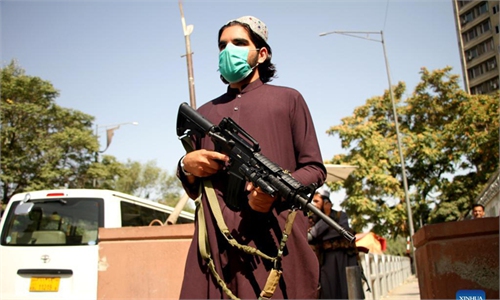
Illustration: Tang Tengfei/GT
India's concern over the US' debacle in Afghanistan is drawing renewed attention with growing pessimism toward the South Asian nation's loss of economic investment and geopolitical influence in Central Asia.
After two days of consultation, diplomats from the US and India agreed to cede their influence in Afghanistan to China, Pakistan and the Taliban so long as the country would not be used to foster terrorism, The Times of India reported on Sunday, citing officials from both sides.
The development may seem like an indication that India, though reluctant, has somehow accepted the reconfiguring of the geopolitical chessboard in Central Asia after the US withdrawal of its military from Afghanistan. But simply accepting reality doesn't mean that India doesn't have to face the strategic choice in formulating a new Afghan policy.
In the past, India followed the US in funneling significant investment into Afghanistan with the main purpose of balancing China and Pakistan. It has been a long-term belief of New Delhi that it is a strategic player in rebalancing global power, but its setback in Afghanistan makes itself look more like a passive player in the regional power play than a major force.
Media reports have revealed that India invested about $3 billion in infrastructure and trade projects in Afghanistan with the help of the security umbrella provided by the US and its Western allies. Yet, with the US retreat, many are concerned about the fate of these projects and the rapidly waning influence of India in Afghanistan.
The collapse of 20 years of efforts is indeed painful and embarrassing for India. While it may be too early to draw such a conclusion, if India continues its opportunistic approach when it comes to regional cooperation, its gambler's mentality will only result in ruin.
At present, the Taliban are stepping up diplomatic push to win international recognition, with Taliban leader Sher Mohammed Abbas Stanekzai recently expressing willingness to continue Afghanistan's political, economic and cultural ties with India.
Against this backdrop, India's choice will be closely watched as to whether it will continue to stand with the US or take a more pragmatic approach toward the Taliban takeover. While New Delhi faces a series of tough choices, the outcome may not be so bad if India is able to find the best solution in the dramatic change in the geopolitical landscape.
India's biggest problem has been its desire to build itself as a global power by playing up its importance in balancing China, which only leads to its loss of the initiative on regional economic integration and cooperation. If India had invested in Afghanistan out of pure economic purposes, it would not be as anxious about its investment and influence in the region as it is now.
If India can embrace regional cooperation from an economic not geopolitical perspective, its presence in the region will not encounter an uncertain future when it comes to participating in reconstruction and retaining existing investment projects in Afghanistan.
China and India are neighbors and regional countries to Afghanistan whose stable development will have direct impact on the two countries. China and India also share common interests in Afghanistan where there are a range of opportunities for cooperation. Therefore, India needs to consider how to safeguard its own interests and embrace regional cooperation as a means of accelerating economic growth. If India designs its regional policies simply on the basis of countering China or pandering to the US, these policies are bound to fail. This is a lesson India should learn from its Afghanistan blunder.



